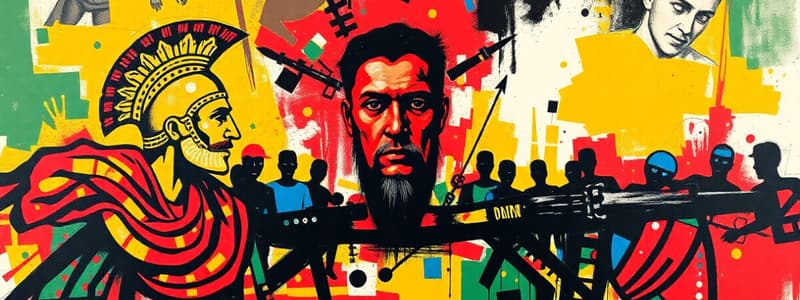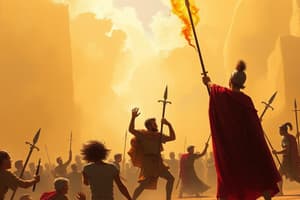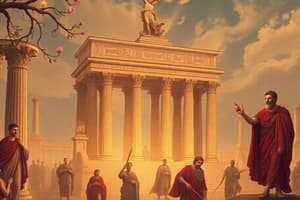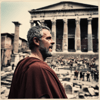Podcast
Questions and Answers
Why does Caesar dismiss Artemidorus's letter?
Why does Caesar dismiss Artemidorus's letter?
- He already knows about the conspiracy against him.
- He prioritizes public matters over personal concerns. (correct)
- He is too busy to read it at that moment.
- He believes Artemidorus is trying to trick him.
What is the significance of Caesar's last words, "Et tu, Brute?"
What is the significance of Caesar's last words, "Et tu, Brute?"
- They signal Caesar's understanding of the conspirators' motives.
- They are a curse upon Brutus and the other conspirators.
- They express Caesar's surprise and betrayal by a close friend. (correct)
- They indicate Caesar's fear of death.
What does Brutus tell the crowd to justify Caesar's assassination?
What does Brutus tell the crowd to justify Caesar's assassination?
- That Caesar had committed crimes against the Roman people.
- That Caesar's ambition posed a threat to Roman liberty. (correct)
- That Caesar was planning to dissolve the Senate.
- That Caesar was mentally unstable and unfit to rule.
Why does Brutus allow Antony to speak at Caesar's funeral, and what condition does he impose?
Why does Brutus allow Antony to speak at Caesar's funeral, and what condition does he impose?
How does Antony begin his funeral oration to manipulate the crowd?
How does Antony begin his funeral oration to manipulate the crowd?
How does Antony use Caesar's will to sway the plebeians against the conspirators?
How does Antony use Caesar's will to sway the plebeians against the conspirators?
Besides the content of Caesar's will, what else does Antony use to incite the crowd?
Besides the content of Caesar's will, what else does Antony use to incite the crowd?
What is the immediate aftermath of Antony's speech?
What is the immediate aftermath of Antony's speech?
What action by Antony most directly leads to the riot in Act 3, Scene 3?
What action by Antony most directly leads to the riot in Act 3, Scene 3?
Why is Cinna the poet attacked by the mob in Act 3, Scene 3?
Why is Cinna the poet attacked by the mob in Act 3, Scene 3?
In Act 4, Scene 1, what does Antony's plan to reduce the amount of money Caesar left to the people reveal about his character?
In Act 4, Scene 1, what does Antony's plan to reduce the amount of money Caesar left to the people reveal about his character?
What motivates Portia to commit suicide in Act 4, Scene 3?
What motivates Portia to commit suicide in Act 4, Scene 3?
What is the significance of Caesar's ghost appearing to Brutus in Act 4, Scene 3?
What is the significance of Caesar's ghost appearing to Brutus in Act 4, Scene 3?
In Act 5, Scene 1, what does Brutus's declaration that he will never be taken alive suggest about his intentions?
In Act 5, Scene 1, what does Brutus's declaration that he will never be taken alive suggest about his intentions?
What tactical error does Brutus make in Act 5, Scene 2 that contributes to his downfall?
What tactical error does Brutus make in Act 5, Scene 2 that contributes to his downfall?
Why does Cassius ask Pindarus to kill him in Act 5, Scene 3?
Why does Cassius ask Pindarus to kill him in Act 5, Scene 3?
What is the significance of Brutus's final words in Act 5, Scene 5: 'Caesar, now be still: I kill'd not thee with half so good a will'?
What is the significance of Brutus's final words in Act 5, Scene 5: 'Caesar, now be still: I kill'd not thee with half so good a will'?
Why does Antony call Brutus 'the noblest Roman of them all' at the end of the play?
Why does Antony call Brutus 'the noblest Roman of them all' at the end of the play?
ceaser stab first who
ceaser stab first who
Flashcards
Act 3 Significance
Act 3 Significance
The turning point of the play, showing the consequences of Caesar's assassination and the start of the power struggles.
Artemidorus's Role
Artemidorus's Role
Tried to warn Caesar with a letter, but was ignored.
Et tu, Brute?
Et tu, Brute?
Expression of shock at being betrayed by a close friend, Brutus.
Brutus's Justification
Brutus's Justification
Signup and view all the flashcards
Antony's vow
Antony's vow
Signup and view all the flashcards
Brutus's Speech Impact
Brutus's Speech Impact
Signup and view all the flashcards
Antony's Rhetoric
Antony's Rhetoric
Signup and view all the flashcards
Caesar's will
Caesar's will
Signup and view all the flashcards
Cinna the Poet
Cinna the Poet
Signup and view all the flashcards
Second Triumvirate
Second Triumvirate
Signup and view all the flashcards
Brutus and Cassius' Quarrel
Brutus and Cassius' Quarrel
Signup and view all the flashcards
Cassius' Complaint
Cassius' Complaint
Signup and view all the flashcards
Portia's Suicide
Portia's Suicide
Signup and view all the flashcards
Ghost of Caesar
Ghost of Caesar
Signup and view all the flashcards
Brutus' Declaration
Brutus' Declaration
Signup and view all the flashcards
Pindarus' Mistake
Pindarus' Mistake
Signup and view all the flashcards
Brutus' Final Words
Brutus' Final Words
Signup and view all the flashcards
Antony's Eulogy
Antony's Eulogy
Signup and view all the flashcards
Study Notes
- Act 3 is the play's turning point, featuring Caesar's assassination's aftermath and the start of the power struggle.
- Act 4 outlines the triumvirate's creation and machinations, while Act 5 details the last battles and their results.
Act 3, Scene 1
- Despite warnings and omens, Caesar goes to the Senate.
- Artemidorus attempts to deliver a letter to Caesar warning him of the conspiracy, but Caesar disregards him, stating personal matters are addressed last.
- The conspirators surround Caesar, and Metellus Cimber asks for his brother's banishment to be revoked, but Caesar refuses.
- The conspirators kneel before Caesar, each offering a reason to approach him.
- Casca is the first to stab Caesar, followed by Brutus and the other conspirators.
- Caesar's dying words are "Et tu, Brute?", expressing shock at Brutus's betrayal.
- After Caesar's death, the conspirators cover their hands and swords in his blood, fulfilling the Soothsayer's prophecy.
- Brutus tells the crowd that Caesar was killed for the good of Rome because his ambition threatened the Republic.
- Brutus persuades the crowd that Caesar's death was required to prevent him from becoming a tyrant.
- Antony arrives, and Brutus allows him to speak at Caesar's funeral after some deliberation.
- Brutus warns Antony not to speak negatively of the conspirators in his address.
- Antony declares his intention to avenge Caesar's death while alone with Caesar's body, foreshadowing the civil war.
Act 3, Scene 2
- Brutus addresses the plebeians, justifying Caesar's assassination by appealing to their fear of tyranny and desire for freedom.
- He claims Caesar was ambitious and that his death saved Rome from slavery.
- The audience is moved by Brutus' remarks and hails him as a hero.
- Brutus departs, leaving Antony to speak.
- Antony begins his funeral oration by stating he comes to bury Caesar, not praise him, but employs rhetoric to sway the audience.
- Antony emphasizes the conspirators are all "honorable men", creating irony.
- He reminds the crowd of Caesar's kindnesses and how he rejected the crown three times, implying he was not ambitious.
- Antony reads Caesar's will, which gives money and land to every Roman citizen, turning the crowd against the conspirators.
- Antony displays Caesar's murdered body, heightening the crowd's wrath and sorrow.
- The crowd transforms into a mob, seeking vengeance for Caesar's death.
- Antony is effective in inciting the crowd to riot and expel the conspirators from Rome.
Act 3, Scene 3
- Cinna the poet is mistaken for Cinna the conspirator and is attacked by the mob.
- The mob's irrational and violent behavior demonstrates the resulting chaos and anarchy in Rome.
- The scene depicts the mob's rage and the loss of reason and order following Caesar's assassination.
Act 4, Scene 1
- Antony, Octavius, and Lepidus meet to discuss Rome's destiny and select which foes to remove.
- They create a death list that includes members of their own families.
- Antony intends to reduce the amount of money Caesar left to the people in his will, demonstrating his ruthlessness.
- Antony sees Lepidus as useless, only helpful for running errands, displaying his ambition and contempt for others.
- The triumvirate's cold and calculating attitude to power underscores the moral depravity that has gripped Rome.
Act 4, Scene 2
- Brutus and Cassius are stationed with their army near Sardis.
- Brutus is disappointed in Cassius, accusing him of taking bribes and acting dishonorably.
- Brutus emphasizes that moral integrity is critical, even during conflict.
Act 4, Scene 3
- Brutus and Cassius have a heated argument over honor and money, exposing the tension in their alliance.
- Brutus accuses Cassius of corruption, while Cassius feels underappreciated and misunderstood.
- The argument is interrupted by news of Portia's death by swallowing hot coals out of concern for Brutus and Rome.
- Outwardly, Brutus is stoic.
- Brutus and Cassius reconcile and develop their plan for the approaching fight against Antony and Octavius.
- Brutus proposes marching to Philippi to confront the enemy due to its strategic advantage.
- Cassius reluctantly agrees with Brutus' strategy.
- Brutus has a vision of Caesar's ghost, who tells him he will see him again at Philippi, foreshadowing Brutus' defeat and death.
Act 5, Scene 1
- Octavius and Antony lead their army to Philippi, ready to face Brutus and Cassius.
- Antony and Octavius exchange insults with Brutus and Cassius, highlighting the animosity between them.
- Cassius is worried about the battle, recounting omens such as ravens being replaced by ominous birds of prey.
- Brutus declares he will never be taken alive, suggesting he will commit suicide rather than be captured.
- Before the battle, the leaders meet and parley.
Act 5, Scene 2
- Brutus orders an early strike on Octavius' troops, believing they are weakening.
- Brutus's premature attack proves to be a strategic blunder.
Act 5, Scene 3
- Cassius' army is defeated and encircled.
- Cassius orders Titinius to determine whether the approaching troops are allies or enemies.
- Pindarus believes Titinius' capture indicates defeat and tells Cassius, who orders Pindarus to kill him to avoid capture.
- Titinius comes with news that the troops were allies, and Cassius' death was caused by miscommunication.
- Titinius kills himself with Cassius' sword upon discovering Cassius' death, showing devotion to Cassius.
Act 5, Scene 4
- Brutus learns of Cassius' death and grieves the loss of his friend and ally.
- Brutus valiantly fights on, but his forces are progressively overcome.
Act 5, Scene 5
- Brutus understands he is losing the battle.
- Brutus begs several of his men to kill him, but they all refuse.
- Strato agrees to hold the sword while Brutus runs onto it, committing suicide to avoid capture.
- Brutus's dying words are, "Caesar, now be still: I kill'd not thee with half so good a will," believing his death atones for Caesar's assassination.
- Antony appears and, after seeing Brutus' body, praises his honorable intentions, calling him "the noblest Roman of them all".
- Octavius commands that Brutus be properly buried, acknowledging his virtue and valor.
- The play concludes with the restoration of order and the promise of a new era in Rome, albeit under the triumvirate's authority.
Studying That Suits You
Use AI to generate personalized quizzes and flashcards to suit your learning preferences.





